Dallas Stars: Top 10 Prospects Entering 2018

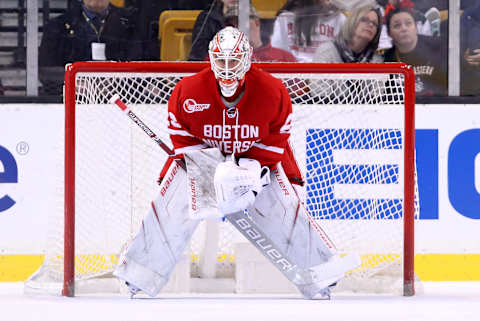
The Dallas Stars’ pipeline has a few notable prospects in it, who can help the team re-establish themselves as a contender and help open the Stanley Cup window. Here are the ten best future Stars.
The Dallas Stars‘ pipeline is not one of the best, but there are multiple prospects who can help the team in the future. The Stars actually do have one great pipeline, and that’s goaltenders. Still, the skaters the team has are also excellent and can help the team become a contender once more.
Here, the prospects are ranked on three factors: NHL readiness, the likelihood said prospect plays consistently with the Stars and ceiling. If one factor is more important than the others, it’s ceiling. To qualify, prospects must not have played their official rookie season (18 games or more). That means that though they’re young, players like Julius Honka and Jason Dickinson do not appear here.
Let’s start with those excellent goaltenders.
1. Jake Oettinger, G [19] (1-26, 2017)
Stats (Boston University, NCAA): 38 gp, 2.45 GAA, .915 SV%.
Jake Oettinger is the best goaltending prospect in the Dallas Stars system and one of the very few goaltenders drafted in the first round. He did so because of an excellent freshman season at Boston University, a powerhouse in the NCAA.
His ceiling remains where it was when he was first drafted – an elite goaltender, one who could be in the Vezina conversations in a few years
He took a major step back in his Sophomore season but remained one of the best goaltenders in the NCAA. While challengers are coming for his spot as the best goaltender in the Stars’ future, it will take more than one bad season to knock him off his custom-made throne.
Oettinger this season was tied for 24th in the NCAA in save percentage and 27th in goals-against average. His ceiling remains where it was when he was first drafted – an elite goaltender, one who could be in the Vezina conversations in a few years. He’s still years away from making an impact at the NHL level, but he will play consistently with the Stars and again, has a higher ceiling than anybody else in the Stars’ excellent goaltending pipeline.
2. Colton Point, G [20] (5-128, 2016)
Stats (Colgate University, NCAA): 33 gp, 1.74 GAA, .944 SV%.
Colton Point is the main challenger to Oettinger’s status as the Dallas Star’s number one future goaltender and had a much better NCAA season than his possible future battery-mate. He was tied for first in the NCAA in save percentage and was 2nd in goals-against average. The problem is, he did it at a year older than Oettinger and in a worse collegiate conference.
He was tied for first in the NCAA in save percentage and was 2nd in goals-against average.
Still, the fifth-round pick used to select Point is looking better and better, and his NHL readiness is more present than Oettinger’s. If there’s an emergency next season and both Ben Bishop and Anton Khudobin are injured, Point could do well as a third-string goaltender, but that’s a lot of pressure on a rookie in the AHL. That’s pressure the best goaltenders live up to, however.
Point’s ceiling isn’t as high as Oettinger’s, but he’s got perhaps the same likelihood of playing for the Dallas Stars, even if it’s in a different role. Having too many goaltenders has never been a problem for an NHL team, especially when both will likely be exempt from the next expansion draft. If he and Oettinger become a 1A/1B scenario for the Stars, isn’t that a great thing?
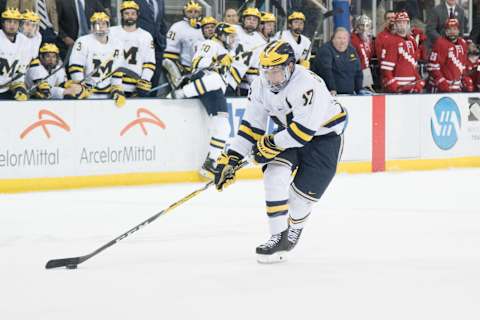
10. Tony Calderone, RW [23] (UDFA)
Stats (University of Michigan, NCAA): 40 gp, 25 g, 20 a, 45 p, 7 PPG, 4 GWG
Stats (Texas Stars, AHL): 3 gp, 1 g, 0 a, 1 p, 1 PPG, 6 SOG, .33 pts/g
Tony Calderone was one of the best forwards in the NCAA this past season, though he was one of the prospects on the older side. For that reason, his numbers need to be taken with a grain of salt. Still, he was fifth in goal scoring, tied for 15th in point production, and was 20th in points per game. Those appear to be good indicators of what Calderone can do, and 45 points in 40 games in the NCAA is nothing to sneeze at.
Calderone could be a middle-six goal scorer heading forward, which is a really excellent thing out of a undrafted college free agent.
Calderone was also great on the power play, scoring seven of his 25 goals on the man advantage, and was useful in clutch situations as well, getting four game-winning goals, about a sixth of Michigan’s total game winners. He did somewhat well in the AHL in his first taste of professional hockey, getting a goal in three games. That should lead to a better year for the Texas Stars next season.
It’s hard to tell what Calderone’s ceiling is because he did extremely well in the NCAA but did so at an elder age and took a huge step, going from 18 points to 45. He appears to be a good goal scorer, which should be the thing he proves in the AHL. If that happens, Calderone could be a middle-six goal scorer heading forward, which is a really excellent thing out ofana undrafted college free agent.
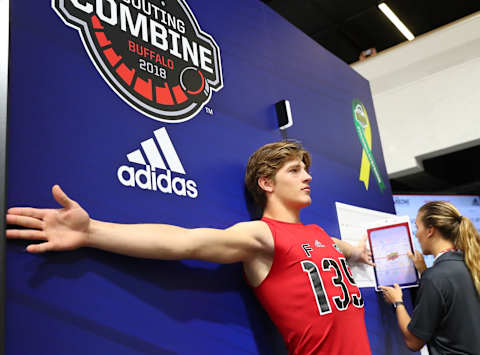
9. Oskar Back, C [18] (3-75, 2018)
Stats (Farjestad BK J20, SuperElit): 38 gp, 10 g, 22 a, 32 p, .84 pts/g (3 pgp, 1 g, 1 a, 2 p, .67 pts/g)
Stats (Farjestad BK, SHL): 14 gp, 0 g, 0 a, 0 p
Oskar Back is a number of years away from making an NHL impact if ever does, which is why he’s fallen so far down this list, even though he was heralded as one of the better picks in this year’s draft and should be a steal at 75. He needs to work on a few things, chief among them shot production and defensive zone work.
If Back reaches the NHL, it will likely be as a playmaking third line center, one who can play well in the defensive zone.
If Back reaches the NHL, it will likely be as a playmaking third line center, one who can play well in the defensive zone. That’s why he needs to work on improving his game, and he’ll need to take more responsibility as a shooter. There are a number of centers ahead of Back in the Dallas Stars system, including another member of this list. The team should be looking to keep Tyler Seguin and Radek Faksa remains young. Back will have to compete and earn his way onto the Stars’ roster.
Back’s currently not got a great chance at being a member of the Dallas Stars. His path is a number of years long, and he appears to be a bottom-six center. But if he can put it all together, he’s still one of the better prospects on this list. Getting 14 games in the Swedish Hockey League at the age of 18 (which Back did) is a hard thing to accomplish.
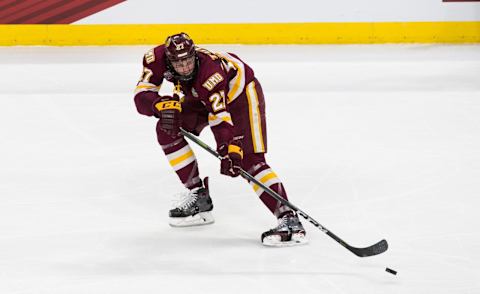
8. Riley Tufte, LW [20] (1-25, 2016)
Stats (University of Minnesota-Duluth, NCAA): 42 gp, 16 g, 13 a, 29 p, 5 PPG, .69 pts/g
What a road Riley Tufte has taken since being drafted in the first round two years ago. He’s not delivered on the hype yet, and it appears the Dallas Stars may have drafted for size over skill. At 6’6″, Tufte is an appealing physical presence, but the league has continued to move further away from lurking physical presences if they can’t skate or score. Tufte has been able to do somewhat well in the second category, but he can still use a little work on both.
At 6’6″, Tufte is an appealing physical presence
That’s why he’s headed back to the University of Minnesota-Duluth for a junior season. To hone his craft and take further steps towards being an NHL-level player. That delays his actual journey into professional hockey, which drops him down this list. He’ll need at least half a season in the AHL, even if he impresses out of the gate, and staying in the NCAA just puts that on hold. Still, development is development, and that’s what the Dallas Stars should hope to see out of Tufte.
He’s also in one of the two best conferences in college hockey and was tied for 43rd in goal scoring at a relatively young age. Getting more ice time against stiff competition will help him, and so will getting ice time at different aspects of the game. He should be a bigger penalty kill presence this season, and if his ceiling is a middle-six forward, then that will only help his game.
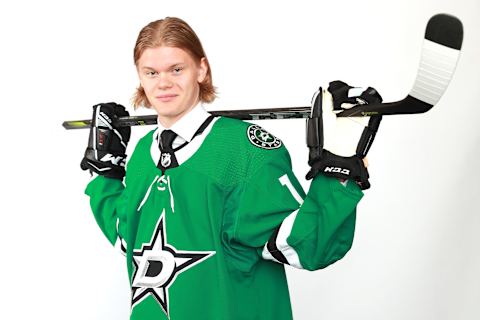
7. Albin Eriksson, RW/LW [18] (2-44, 2018)
Stats (Skelleftea AIK J20, SuperElit): 38 gp, 22 g, 18 a, 40 p, 1.05 pts/g (3 pgp, 0 g, 6 a, 6 p, 2 pts/g)
Stats (Skelleftea AIK, SHL): 17 gp, 0 g, 1 a, 1 p (2 pgp, 0 g, 0 a, 0 p). Skelleftea AIK, SHL
Albin Eriksson was one of the best forwards in the SuperElit last season and was tied for 18th in scoring, fourth in goal scoring, 57th in assists, and 21st in points per game (more than 10 games played). Eriksson also got 17 games in the Swedish Hockey League and scored his first professional point. He’s getting closer to being an NHL-ready player, and is already an excellent playmaker and has the ability to shoot as well.
Eriksson is a really intriguing prospect, one who went from being one of the best goal scorers in the SuperElit to being one of the best playmakers
He was also a top 50 pick in the 2018 draft and has the ability to be better than even that. His ceiling is likely a top-six forward, though he’s a couple years away from that (which is why he’s only at seven on this list).
Eriksson is a really intriguing prospect, one who went from being one of the best goal scorers in the SuperElit to being one of the best playmakers because of a flip from the regular season to postseason.
He went from being tied for fourth in goal scoring to being tied for fourth in playoff assists. Eriksson was 19th in playoff scoring and tied for eighth in points per game. He’s an excellent prospect moving forward, though his NHL readiness still needs work and he’ll need to make the North American transition to prove his ceiling.
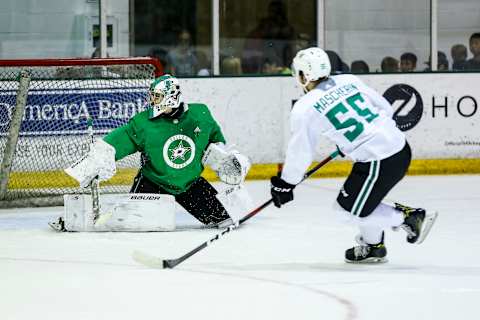
6. Adam Mascherin, LW [20] (4-100, 2018)
Stats (Kitchener Rangers, OHL): 67 gp, 40 g, 46 a, 86 p, 12 PPG (18 A), 6 GWG, 255 SOG, 1.28 pts/g (19 pgp, 9 g, 15 a, 24 p, 2 PPG (7 A), 2 GWG, 76 SOG, .1.26 pts/g).
Mascherin was one of the very few prospects who were drafted twice. He was drafted in the second round in 2016 and then again in the fourth round by the Dallas Stars. He was only drafted in the fourth round because he’s now 20 years old and because he flaked on the first team that drafted him.
But the Stars knew the risks when they took him, and those risks should pay off. Adam Mascherin is another very solid prospect, though one who will make a more immediate splash than a more impactful one.
He’s talented, got great skating, and has an excellent work ethic.
Mascherin was ninth in scoring, tied for eighth in goal scoring and 16th in assists, and was tied for 18th in points per game in the OHL’s regular season. In the postseason, those numbers went to ninth in scoring, 11th in points per game, and tied for seventh in assists and 13th in goal scoring. Those are very good numbers, but again, Mascherin is 20 years old.
His ceiling is likely that of a bottom-six forward, and he’s still at least a year away from being NHL ready. He’s talented, got great skating, and has an excellent work ethic. He’s good in both zones and should be able to play on the penalty kill and potentially the power play. It’ll be interesting to see him in the AHL this year, because if he can transition quickly then he could be a useful asset for the Dallas Stars in the very near future as they attempt to re-establish themselves as a contender.
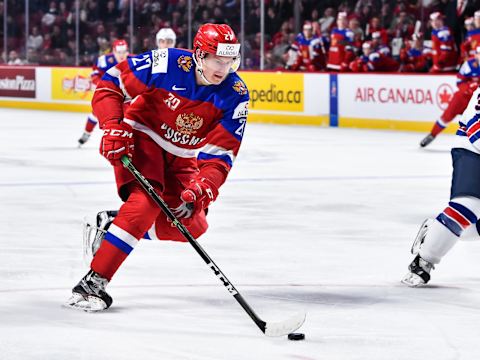
5. DenisGuryanov, RW [21] (1-12, 2015)
Stats (Texas Stars, AHL): 74 gp, 19 g, 15 a, 34 p, 3 PPG (3 A), 5 GWG, 110 SOG, .46 pts/g (16 pgp, 2 g, 3 a, 5 p, 1 GWG, 17 SOG, .31 pts/g).
Guryanov is quickly fading from being a top 15 draft pick, and didn’t look so good in the AHL in his second season. He only had 19 goals and 15 assists. Though he did get five game-winning goals. In the playoffs, Denis Guryanov was a healthy scratch at times, which is what Dallas Stars fans need to pay attention to, and which keeps Guryanov from climbing any higher.
3 Potential Breakout Candidates For The Stars. light. Trending
He’s already played a game with the Dallas Stars (once in 2016-17), and he has developed further since then. His NHL readiness is above everyone else before him on this list, and the chances that he plays with the Stars consistently are at least even. His ceiling isn’t as high as the players ahead of him on this list, however.
If Guryanov can be better this upcoming season, following any sophomore slump, he could regain his form as a top prospect for the Dallas Stars. Entering the 2018 season, however, he’s ahead of better players with higher ceilings only because he does better in the two other categories.
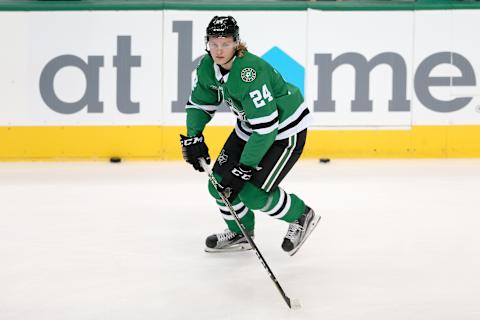
4. Roope Hintz, LW [21] (2-49, 2015)
Stats (Texas Stars, AHL): 70 gp, 20 g, 15 a, 35 p, 7 PPG (3 A), 2 GWG, 153 SOG, .5 pts/g (22 pgp, 4 g, 8 a, 12 p, 3 PPA, 1 GWG, 36 SOG, .55 pts/g).
27th rookie scoring, T-12 rookie goal scoring; T-2 rookie playoff scoring, 1st assists, T-7 goal scoring, 13th pts/g
Roope Hintz did better than Guryanov in the same league on the same team, which is why Hintz is above him. He also did it in his rookie season and outperformed him at most aspects of the game. Yes, seven of Hintz’s 20 goals were from the power play, but that may be a good thing, as Hintz should eventually get power-play time. Hintz appears to have top-six potential, and could be a very good physical presence as well, standing at 6’3″.
Hot. Greatest NHL Player To Wear Each Number. light
Hintz skates well, has a lot of skill, and in total is a very good package. That’s why he could have more potential than a lot of other Dallas Stars prospects and did better than many other rookies in the AHL. He was 27th in rookie scoring in the regular season and was tied for 12th in rookie goal scoring. In the playoffs, Hintz was tied for second in rookie scoring, was first in assists, 13th in points per game, and was tied for seventh in goal scoring amongst the new AHLers.
Hintz has displayed various abilities throughout his year in the AHL and has very quickly become NHL ready, or so it seems. If he plays games with the Dallas Stars this season, that will be him being on track. He’s better than a lot of other prospects the Stars had in the AHL last season, and with them needing a push, he could come in handy.
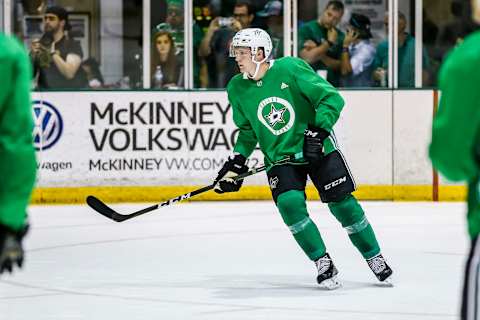
3. Ty Dellandrea, C [18] (1-13, 2018)
Stats (Flint Firebirds, OHL): 67 gp, 27 g, 32 a, 59 p, 10 PPG (9 A), 2 SHG (3 A), 5 GWG, 239 SOG, 50.6 FO%, .88 pts/g.
T-54 scoring, T-42 goal scoring, T-67 assists, T-70 pts/g
Ty Dellandrea‘s ceiling is a second-line center, the future second punch to Tyler Seguin and Jamie Benn‘s first line prowess. He didn’t look that good in the OHL last season, coming in tied for 54th in scoring, but that’s also because he lacked quality of teammates in a hard league, and the Flint Firebirds missed the playoffs despite his best efforts. Dellandrea had 59 points in 67 games played, and while that’s not as impressive as other players, it sure impressed the Dallas Stars, who took Dellandrea well above where he was projected.
Dallas Stars' Ideal Offseason. light. Related Story
Dellandrea’s prowess as both a playmaker and goal scorer are causes for optimism next season, as he’ll try to help the Firebirds make the playoffs again. Hopefully, he’ll have more to play with, and he’ll also likely have more ice time, as he’ll become the star of the team and the first line center. He’ll likely get more minutes on the power play and while shorthanded, both areas where he did well last season. He was decent at faceoffs, though that’s an area he’ll need to improve, and his shot production should go up as well.
He’s not NHL ready quite yet, but the chances are high he’ll eventually play with the Dallas Stars when he is. He’s got an excellent ceiling, and should be an important member of the Stars down the road. He’s got all the assets he needs to succeed in the NHL, including good skating and great hands, as well as defensive responsibility. He just isn’t ready yet.
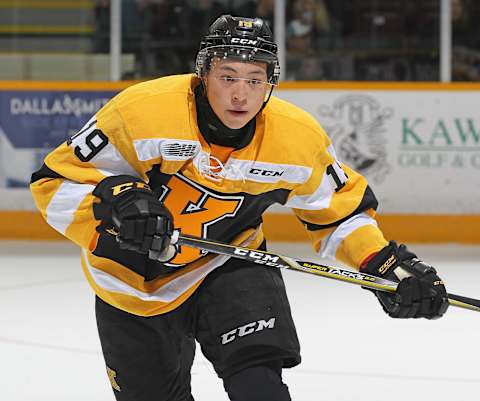
2. Jason Robertson, LW [19] (2-39, 2017)
Stats (Kingston Frontenacs, OHL): 68 gp, 41 g, 46 a, 87 p, 15 PPG (21 A), 8 GWG, 308 SOG, 1.28 pts/g, (16 pgp, 10 g, 8 a, 18 p, 5 PPG (5 A), 61 SOG, 1.13 pts/g).
T-7 scoring, T-6 goal scoring, T-16 assists, T-18 pts/g; T-16 playoff scoring, T-9 goal scoring, T-31 assists, T-29 pts/g
Robertson very quickly showed why he was taken in the top 40 of the 2017 draft this season. He’s been one of the best prospects the Dallas Stars have since he was drafted, and has shown a ton of value over the past season. He was tied for seventh in the OHL in scoring, was tied for sixth in goal scoring, 16th in assists, and 18th in points per game. In the postseason, Jason Robertson was tied for 16th in scoring and ninth in goal scoring.
Stars' Top 5 Free Agent Signings. light. Related Story
It’s appearing like he has the potential to be a top-six winger, someone who can play both directions but has an incredible ability in the offensive zone to set up and finish plays. That’s something the Dallas Stars will need, especially as the core continues to age. Bringing in a young gun like Robertson in to work with Dellandrea in the future or Seguin and Benn could be a very smart idea.
His ceiling is high, he’s very likely to be a Dallas Stars contibutor, and while he’s not NHL ready yet, he’ll get there eventually. He’s Dallas’s second-best prospect.
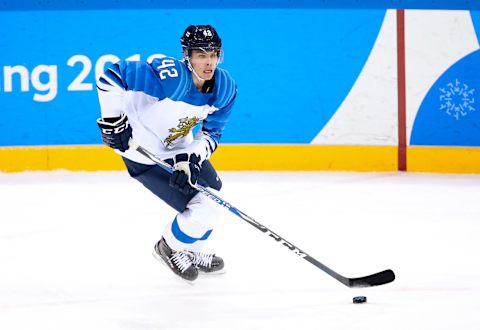
1. Miro Heiskanen, D [19] (1-3, 2017)
Stats (HIFK, Liiga): 30 gp, 11 g, 12 a, 23 p, 1 PPG, 1 SHG, 4 GWG, .77 pts/g (14 pgp, 3 g, 6 a, 9 p, 1 PPG, .64 pts/g).
Miro Heiskanen will be a member of the Dallas Stars this year. That means he’s 100 percent going to be a contributor and has been deemed NHL ready. He’s got a very high ceiling, and could be a top-pairing defenseman. He played well in the Finnish Liiga last season and was a contributor at the professional level a season after being drafted. He was tied for 106th amongst all Liiga players (24th amongst defensemen), was tied for ninth amongst defenders in goal scoring, 34th in assists, and was first in defensive points per game. He did exceptionally in the playoffs as well, ranking first in scoring and assists, and was tied for second in points per game.
He’s one of the very best prospects on any team, and that’s why he’s number one here. He’s the only game changer the Dallas Stars have in the pipeline, but for that to be a defenseman is a great thing for the team. He might not be the number one guy ever, but with John Klingberg still young, it’s not like Heiskanen needs to be. He can cover his own end well and is an excellent offensive presence.
Next. Each NHL Team's Worst Contract. dark
In a defensive league, Heiskanen even scored a shorthanded goal. He’s the type of defenseman modern coaches dream about, where he can move the puck well, score, and defend. He’s also got the ability to play on every special teams unit, and can be an elite two-way defenseman in the future. There’s a reason he was drafted number three.